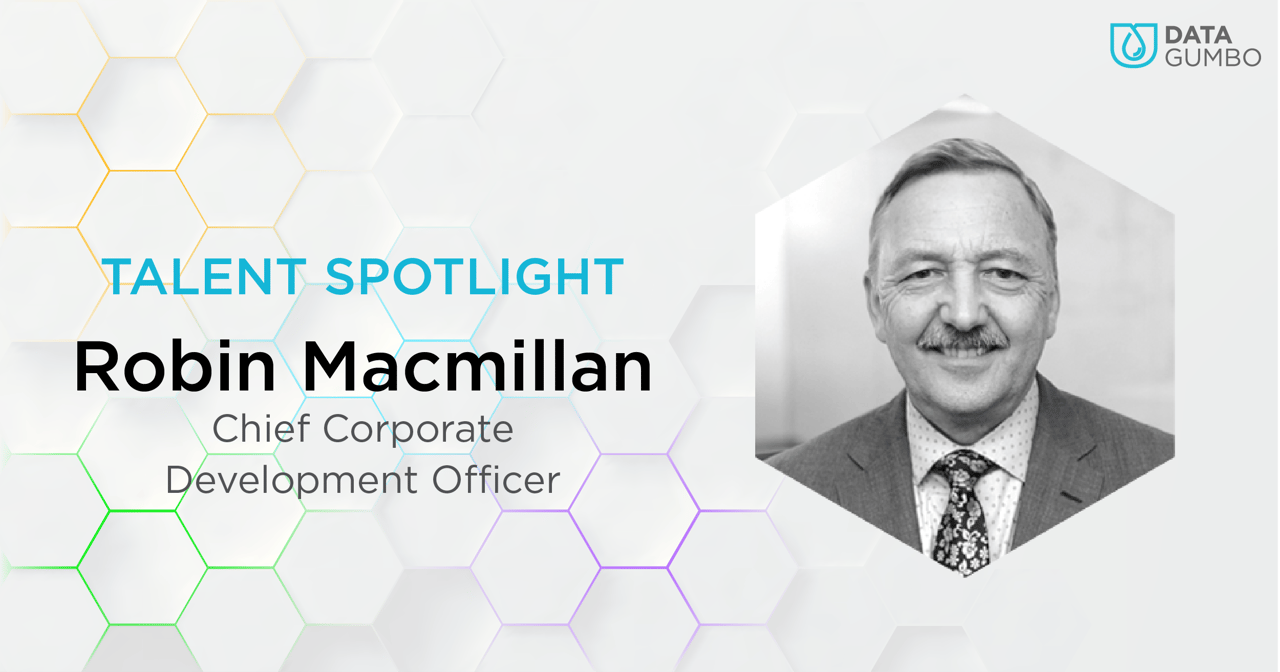Data Gumbo Talent Spotlight: Robin Macmillan
As part of our ongoing talent spotlight blogs, here we add Robin Macmillan to our efforts to highlight our diverse and growing company. Previous profiles include: Dinika Byrappa, Product Manager; Henry Le, Associate Solutions Consultant; Jack Gibbs, Director, Commercial; Anna Brown, Director of Knowledge Transfer and Denyel Renevillia, Director of Customer Success.
Last month, Data Gumbo expanded its executive team with the addition of Robin Macmillan, Chief Corporate Development Officer to lead the Corporate Development team. With a 40+ year career in energy, Macmillan joins the company from his latest position as Vice President and Senior Vice President for Business Development at National Oilwell Varco (NOV Inc.), the American multinational corporation and leading worldwide provider of equipment and services to upstream the oil and gas industry.
Additionally, Macmillan is the current VP of Drilling Services at the International Association of Drilling Contractors (IADC), where he is also Chair Emeritus of the Advanced Rig Technology committee. As well, he is vice-chair of the Society of Petroleum Engineers (SPE) Drilling Systems Automation Technical Section. With a degree in Geology from the University of Leeds in England, Macmillan has worked in numerous countries including eight years in Latin America. His previous experience includes Management of Schlumberger Drilling and Measurements in Canada and President at the drill bit company ReedHycalog.
Welcome to Data Gumbo Robin! Let‘s dig into your extensive industry experience.
First, can you give us a brief synopsis of your professional history.
I started work in the oil and gas industry in the Rio Grande Valley, Texas, where I enjoyed the challenge of a steep learning curve in drilling technology. From there I worked internationally in Africa, the Middle East, Europe and Latin America. I moved into sales roles with ReedHycalog initially in Aberdeen, Scotland but later in Venezuela where I became fluent in Spanish. During my five years in Venezuela, the company was acquired by Schlumberger and I transferred to Canada, as Schlumberger Drilling and Measurements Manager. Subsequently Schlumberger sold ReedHycalog to Grant Prideco. I moved with it and then became President of ReedHycalog. Following acquisitions, the business grew to a $600 million enterprise with several international manufacturing plants and revenue from around fifty countries. NOV acquired Grant Prideco in 2008. I spent the majority of my years at NOV as SVP of Business Development where many of the challenges involved encouraging client adoption of new technologies, both hardware and software, through quantifying value propositions and employing the principles of results-focused innovation.
How does it feel to be working at a fast-growing tech startup?
Very exciting. I enjoy change, relish a challenge and am delighted to work in a team of talented individuals with an outstanding can-do attitude.
How are you seeing digital transformation play out in the energy sector? Any predictions about where the industry is going as it recovers from the last year and moves into the future?
The energy industry needs digital transformation to improve the efficiency of both operations and business processes. Distributed ledger technology (DLT), otherwise known as blockchain, can play a big part in that transformation.
The ROI from the application of smart contracts backed by blockchain for example, is remarkable. The data required to drive smart contracts can also support the tracking of ESG performance, which is becoming a huge priority in the energy sector. As companies are pushed by both the investment community and public opinion to demonstrate auditable data for Scope 1, 2 and 3 emissions performances, there is an increasing demand for the technology that can enable such tracking.
What opportunities exist for creating new sector-agnostic business processes today?
Many of the use cases that Data Gumbo has developed are applicable in multiple industries. As we explore new verticals, it is increasingly apparent that numerous use cases provide horizontal opportunities applicable across industries. The auditable tracking of ESG data is just one example, but commodity haulage and insurance also fall into this category. Any business system with substantially manual processes that are rich in data are obvious candidates. Manual invoicing and reconciliation procedures are notoriously laborious pursuits that continue to hamper business efficiency. The data often exists, or can be generated, to impressively streamline these instances, and at Data Gumbo we have seen service-to-payment periods reduced by up to 97%.
Are there any technology trends that you follow and what interests you most about them?
Formula One motor racing is a fascinating combination of data-driven technology and human skill. In-car sensors are monitored enabling engineers to adjust technical settings remotely. Many of the technologies developed in this realm find their way into other industries. Kinetic energy recovery systems, for example, are now applied to drilling rigs.
What excites you about being at Data Gumbo?
I know from experience that the business world urgently needs all that Data Gumbo can offer. It is very rewarding to be part of a team applying a technology that can make such a dramatic difference.


